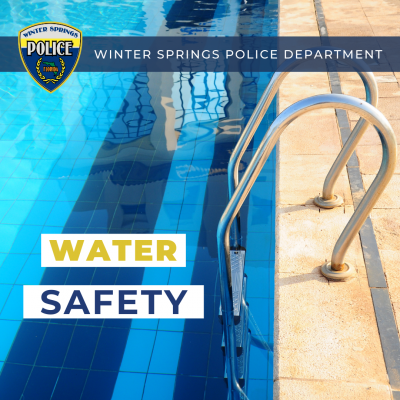May 2021: Water Safety Month
May Is Water Safety Month
Living in Florida, we all know there are two seasons: hot and hotter! As the temperature rises, so does activity in and around the water.
The Winter Springs Police Department would like to remind everyone that even though we look forward to summer around the pool or at the beach, some inherent dangers come with our attempts to stay cool. Keep these rules in mind to keep your summer safe and refreshing. Distractions make for tragedies.
NEVER LEAVE A CHILD UNATTENDED AROUND ANY BODY OF WATER
- Teach your children basic water safety skills.
- Learn how to swim and ensure your children know how to swim as well.
- Ensure the body of water matches your skill level; swimming in a pool is much different from swimming in a lake or river, where more strength is needed to handle currents.
- If you do get caught in a current, don't try to fight it; stay calm and float with it, or swim parallel to the shore until you can swim free.
- Don't dive into unfamiliar areas.
- Have a phone close by in case of emergencies when visiting a pool, spa, or beach.
POOL SAFETY
- Install a 4-foot fence around the perimeter of the pool or spa, including portable pools. Building codes require adequate pool safety measures.
- If your house wall serves as the fourth side of a fence around a pool, install and use a door or pool alarm.
- Maintain all pool and spa covers in good working order.
- Ensure any pool or spa you use has compliant drain covers; ask for clarification if you do not know.
- Never swim alone.
- Have lifesaving equipment such as life rings, floats, or a reaching pole available and easily accessible.
- Share safety instructions with family, friends, babysitters, and neighbors.
- Learn CPR and rescue techniques.
- Don't push or jump on others.
- Don't dive into unfamiliar areas.
- Never drink alcohol when swimming; alcohol is involved in about half of all male teen drownings, according to KidsHealth.org.
For more information, click here.
PEDIATRIC HEATSTROKE
Pediatric vehicular heatstroke deaths occur when a caregiver forgets a child in a vehicle, the child gains access to a vehicle, or someone knowingly leaves a child in a vehicle.
As temperatures across the country continue to climb this summer and states begin to reopen, the National Safety Council is calling on Americans to educate themselves about the dangers of pediatric vehicular heatstroke and how to prevent it.
Often when caregivers forget a child, they are outside of their routine, under stress, or have experienced a lack of sleep, which is not uncommon for new parents. Also, during the COVID-19 pandemic, more vehicles have been sitting idle, and already this year, three children have died after gaining access to unlocked vehicles.
- Keep car doors locked so children cannot gain access.
- Teach children not to play in cars as they can be dangerous.
- Create a habit of constantly checking the backseat before leaving your car.
- Place your purse, briefcase, or cell phone in the backseat, forcing you to look before you lock your car and walk away.
- Never leave a child in a vehicle when running errands, not even for a minute. Rolling down a window does little to keep a vehicle cool, and heatstroke deaths have occurred even in vehicles parked in shaded areas. There is no safe period of time for leaving a child in a vehicle.
Bystanders can also play an important role in saving a life. If you see a child alone in a vehicle, call 911 and get help immediately.
For more information, click here.
Do you want to know what is going on in Winter Springs?
E-Alerts are a great way to receive information from the police department about what is going on throughout the city. These alerts include real-time information regarding major traffic issues such as traffic crashes and police activity in our communities.

